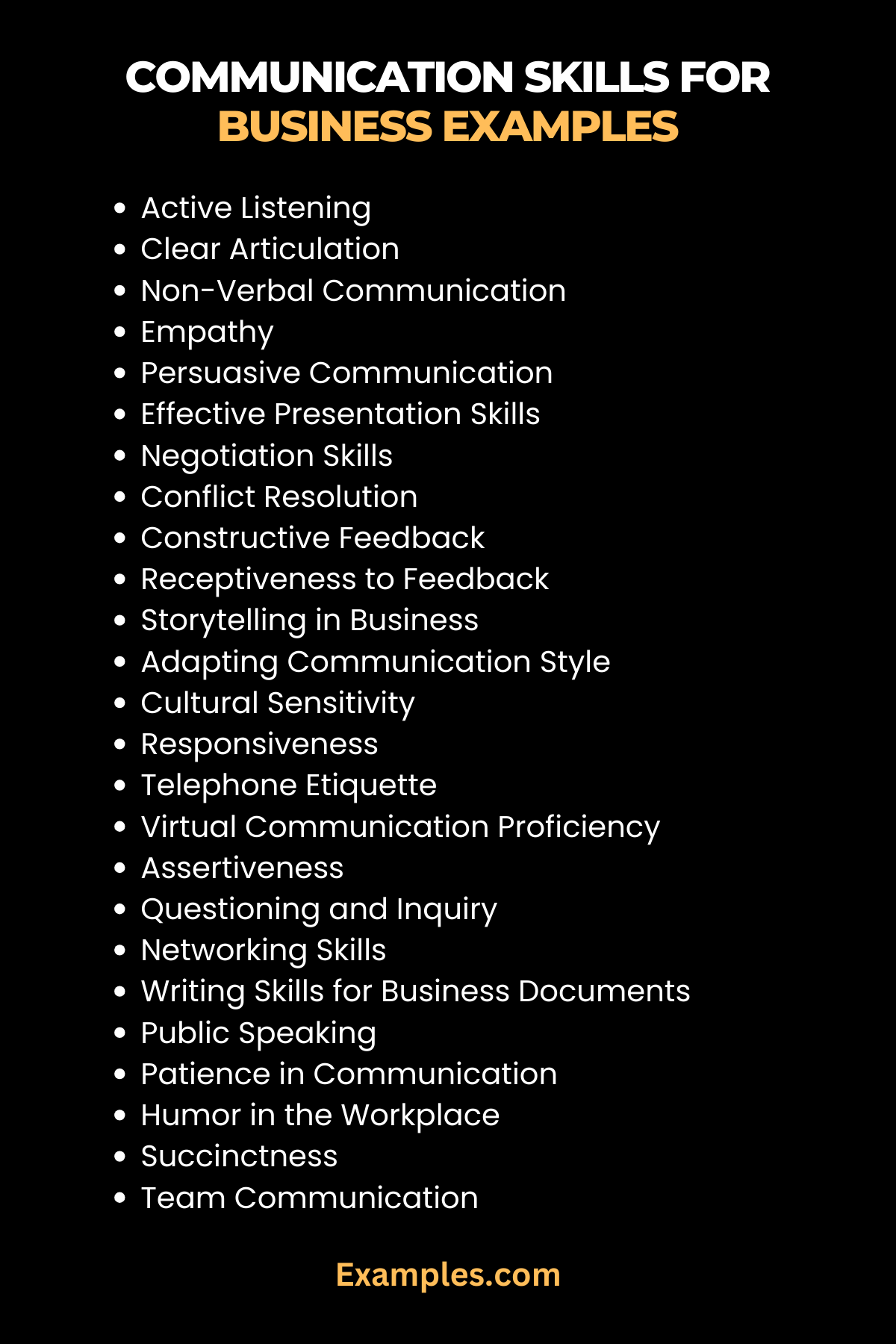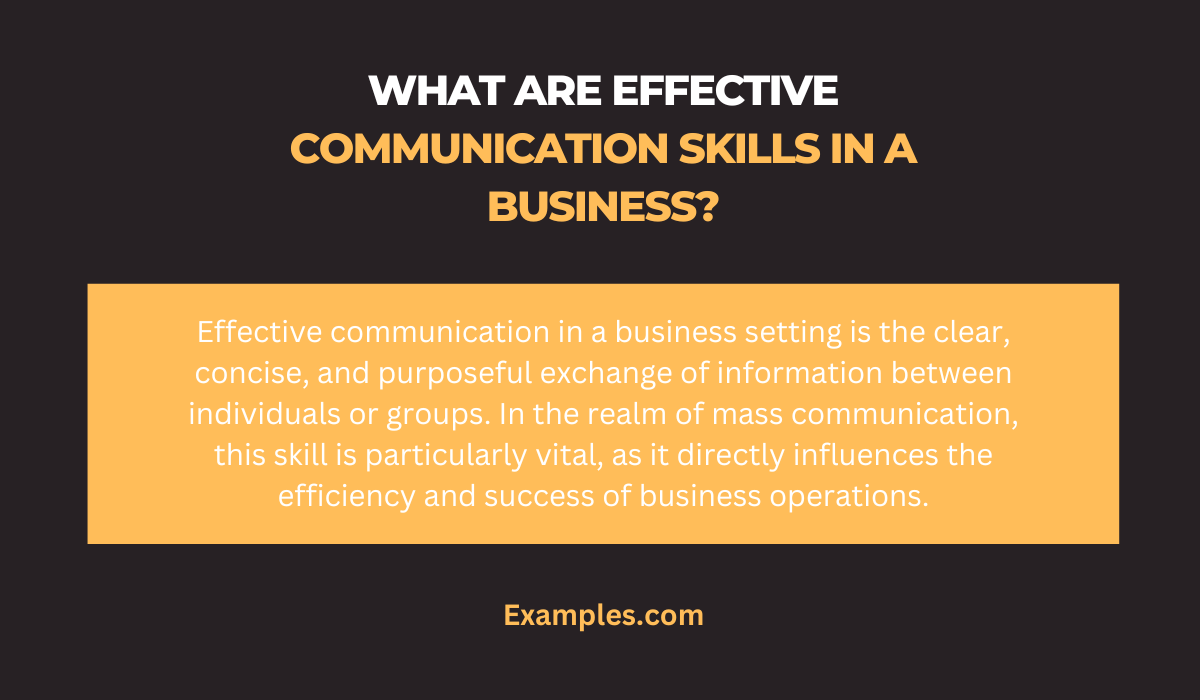29+ Communication Skills for Business Examples
In the competitive world of business, robust Communication Skills are indispensable. They not only facilitate smoother interactions but also drive effective decision-making, teamwork, and leadership. This guide delves into the nuances of communication skills tailored for the business environment, highlighting their critical role in negotiations, client relations, and team dynamics. Whether it’s through verbal, written, or digital means, refining these skills can significantly enhance business operations and contribute to overall success.
30 Communication Skills for Business
Here are 30 key communication skills for business success, each accompanied by a distinct example and an explanation of how these skills can be applied effectively in a business context.

- Active Listening:
Example: “I understand that this deadline is challenging. How can we better manage this project together?”
Actively listen to concerns and respond by acknowledging the issue and seeking collaborative solutions. - Clear Articulation:
Example: “Our goal is to increase client engagement by 20% through targeted marketing strategies.”
Communicate your objectives clearly to ensure everyone is aligned with the company’s goals. - Non-Verbal Communication:
Example: Nodding and maintaining eye contact during a presentation.
Use body language to show engagement and reinforce your verbal messages. - Empathy:
Example: “I understand the challenges you’re facing and am here to help find a solution.”
Show understanding towards colleagues or clients, fostering a supportive environment. - Persuasive Communication:
Example: “Our product not only meets your needs but also offers additional benefits that save costs.”
Convey your points persuasively to influence decisions and win over clients or stakeholders.

- Effective Presentation Skills:
Example: “Today, I’ll outline our strategy, which I believe will revolutionize our approach.”
Deliver engaging and well-structured presentations to captivate and inform your audience. - Negotiation Skills:
Example: “Let’s find a middle ground that benefits both our companies.”
Employ negotiation techniques to reach mutually beneficial agreements. - Conflict Resolution:
Example: “Let’s discuss what went wrong and how we can prevent this in the future.”
Address conflicts proactively by focusing on solutions and mutual understanding. - Constructive Feedback:
Example: “Your report was comprehensive, but adding more data analysis could enhance its impact.”
Provide feedback that is specific, actionable, and aimed at improvement. - Receptiveness to Feedback:
Example: “Thank you for the feedback. I’ll work on incorporating those changes.”
Demonstrate openness to feedback and a willingness to adapt and grow. - Storytelling in Business:
Example: “Our company started in a small garage, and now we’re a market leader.”
Use storytelling to make your messages more relatable and memorable.

- Adapting Communication Style:
Example: “For our technical team, I’ll include more data in my presentation.”
Tailor your communication style to fit the audience’s preferences and understanding. - Cultural Sensitivity:
Example: “I appreciate the diversity in our team and am eager to learn from all of you.”
Recognize and respect cultural differences to foster an inclusive workplace. - Professional Email Communication:
Example: “Dear Team, please find attached the report for your review. Your feedback is appreciated.”
Craft clear, concise, and respectful emails for effective digital communication. - Telephone Etiquette:
Example: “Thank you for calling. How can I assist you today?”
Use polite and clear language on phone calls to maintain professionalism. - Virtual Communication Proficiency:
Example: “Let’s switch to a video call for a more detailed discussion on this.”
Utilize virtual communication tools effectively for remote discussions and meetings. - Assertiveness:
Example: “I firmly believe this approach will yield the best results for our project.”
Communicate your ideas confidently and assertively while respecting others’ opinions. - Questioning and Inquiry:
Example: “Could you elaborate more on how this strategy will benefit our project?”
Ask relevant questions to gain deeper insights and encourage open dialogue.

- Networking Skills:
Example: “It was great meeting you at the conference. Let’s keep in touch to explore potential collaborations.”
Build and maintain professional relationships through effective networking communication. - Writing Skills for Business Documents:
Example: “This proposal outlines the project scope, deliverables, and timelines in detail.”
Develop clear and concise writing skills for creating impactful business documents. - Public Speaking:
Example: “Today, I’m excited to share insights that could transform our business operations.”
Hone public speaking skills to effectively address larger audiences and convey key messages. - Patience in Communication:
Example: “I understand this is complex. Take your time explaining, and I’m here to listen.”
Exhibit patience, especially when dealing with complex or sensitive topics. - Humor in the Workplace:
Example: “As we tackle this challenging project, let’s remember to also have some fun along the way.”
Appropriately use humor to lighten the mood and enhance team bonding.

- Succinctness:
Example: “In summary, this strategy will increase efficiency and reduce costs.”
Be concise in your communication to convey key points without unnecessary detail. - Emotional Intelligence:
Example: “I sense some hesitation. Can we discuss any concerns you have?”
Use emotional intelligence to navigate and respond to the emotions of others effectively. - Team Communication:
Example: “Let’s all share updates on our progress in the next team meeting.”
Facilitate open and inclusive communication within teams to ensure collaborative success. - Understanding and Clarifying:
Example: “Just to clarify, are you suggesting we change our approach to client engagement?”
Ensure understanding by clarifying and confirming key points in conversations. - Responsiveness:
Example: “I received your email and will get back to you with a detailed response by tomorrow.”
Respond promptly to queries and messages to maintain effective and respectful communication. - Paraphrasing for Clarity:
Example: “So, what you’re saying is we need to focus more on market research, correct?”
Paraphrase to confirm understanding and demonstrate active listening. - Confidence in Communication:
Example: “I am confident that our team has the expertise to successfully complete this project.”
Express your ideas with confidence to establish credibility and inspire trust.
What are Effective Communication Skills in a Business?
Effective communication in a business setting is the clear, concise, and purposeful exchange of information between individuals or groups. In the realm of communication skill, this skill is particularly vital, as it directly influences the efficiency and success of business operations.

Key Characteristics of Effective Business Communication
- Clarity and Conciseness: Messages should be straightforward and to the point, avoiding unnecessary jargon or complexity.
- Active Listening: Engaging fully in the conversation, understanding the message, and responding appropriately.
- Positive Body Language: Using non-verbal cues like eye contact and open gestures to reinforce spoken words.
- Empathy: Understanding and acknowledging others’ perspectives to build trust and rapport.
- Feedback: Offering and being receptive to constructive feedback for continuous improvement.
Channels of Business Communication
- Verbal Communication: In-person discussions, phone calls, and video conferences.
- Written Communication: Emails, reports, and instant messaging.
- Non-Verbal Communication: Body language and visual elements like graphs or charts.
Effective communication in business ensures that all parties involved have a clear understanding of objectives and expectations, leading to better collaboration and decision-making.
Why are Communication Skills Important in Business?
In the dynamic realm of business, particularly in fields like Communication Skill, effective communication skills are pivotal for success. They serve as the foundation for various aspects of business operations, from internal management to external relations.
Facilitating Clear Information Exchange
Clear communication ensures that information is accurately conveyed and understood, reducing the likelihood of errors and misunderstandings that can impede business processes.
Enhancing Team Collaboration
Effective communication fosters teamwork, enabling smoother collaboration and coordination among team members, essential for achieving business goals.
Building Strong Client Relationships
The ability to communicate effectively with clients is crucial for establishing trust, understanding client needs, and ensuring customer satisfaction, which is vital for business growth.
Driving Effective Decision-Making
In business, decisions often need to be made quickly and efficiently. Good communication skills ensure that all relevant information is shared and understood, leading to better decision-making.
Resolving Conflicts
Conflicts are inevitable in any business setting. Strong communication skills help in resolving these conflicts amicably and constructively.
Boosting Employee Morale and Engagement
Open and transparent communication contributes to a positive workplace environment, boosting employee morale and engagement.
How to Highlight Business Communication Skills?
In the business world, and especially in Communication Skill, it’s essential not only to possess strong communication skills but also to effectively highlight them.
Showcase in Your Resume and Cover Letter
Incorporate specific examples of your communication skills in your resume and cover letter. Mention instances where your communication skills led to positive outcomes or contributed to project success.
Demonstrate During Interviews
Use the interview as an opportunity to demonstrate your communication skills. Articulate your responses clearly, listen attentively to the interviewer’s questions, and engage in a professional manner.
Provide Real-Life Examples
Be prepared with anecdotes that showcase your communication skills. Discuss situations where your ability to communicate effectively helped resolve a complex issue or improved team dynamics.
Highlight in Performance Reviews
During performance reviews, discuss how your communication skills have contributed to your achievements and the success of your team or projects.
Utilize LinkedIn and Professional Networks
On platforms like LinkedIn, participate in discussions, share insightful posts, and engage with your network to demonstrate your communication prowess.
Seek Endorsements and Recommendations
Endorsements and recommendations from colleagues, clients, or supervisors can validate your communication skills. Encourage them to mention specific skills like effective team communication or client negotiation.
By highlighting these skills effectively, you can showcase your ability to navigate the complex landscape of business communications, making you a valuable asset in any communication skill or business role.
What Makes Great Communication Skills in Business?
In the realm of business, particularly in areas like communication skills and leadership, possessing great communication abilities is key to success. These skills facilitate effective interactions, enabling businesses to build relationships, solve problems, and create strategies that drive growth and innovation.
Clarity and Precision
- Conciseness in Messaging: Delivering clear, concise messages avoids confusion and ensures that everyone is on the same page.
- Articulate Speaking: Articulate speech, both in verbal and written forms, is essential to convey ideas effectively and professionally.
Active Listening
- Engagement in Conversations: Demonstrating active listening skills, such as paraphrasing and asking clarifying questions, shows engagement and understanding.
- Feedback Reception: Being receptive to feedback and incorporating it into your business strategies improves communication and business processes.
Empathy and Emotional Intelligence
- Understanding Diverse Perspectives: Showing empathy in communications helps in understanding the needs and viewpoints of clients, colleagues, and stakeholders.
- Emotional Awareness: Emotional intelligence in communication fosters healthier work environments and more effective team collaborations.
Effective Non-Verbal Communication
- Body Language and Eye Contact: Non-verbal cues, such as body language and eye contact, play a significant role in reinforcing or contradicting verbal messages.
- Professional Appearance: A professional appearance and demeanor in business settings can enhance the effectiveness of your communication.
Persuasion and Influencing Skills
- Influential Speech: The ability to persuade and influence others is crucial in negotiations, sales, and leadership roles.
- Rhetorical Techniques: Using rhetorical techniques appropriately can help in convincing and engaging your audience.
Public Speaking and Presentation Skills
- Confident Public Speaking: Strong public speaking skills are necessary for effective presentations, pitches, and meetings.
- Engaging Presentation Style: An engaging presentation style, including the use of visual aids and storytelling, can captivate your audience and effectively convey your message.
Conflict Resolution and Negotiation
- Navigating Disputes: Effective communication skills are crucial in resolving conflicts and finding mutually beneficial solutions.
- Negotiation Techniques: Mastery of negotiation techniques aids in reaching agreements that align with business goals.
Adaptability in Communication
- Flexibility in Styles: The ability to adapt your communication style to different audiences and situations is vital in business.
- Cultural Sensitivity: Cultural sensitivity in communication enhances global business relations and partnerships.
Effective Written Communication
- Professional Writing: Crafting clear, professional written communications, such as emails and reports, ensures that your message is understood and taken seriously.
- Detail-Oriented Documentation: Paying attention to detail in business documentation ensures accuracy and professionalism.
Technological Proficiency
- Digital Communication Tools: Proficiency in using digital communication tools, like email, social media, and collaboration platforms, is essential in modern business environments.
- Staying Technologically Updated: Keeping abreast of the latest communication technologies and trends can give businesses a competitive edge.
In the business world, especially in sectors like communication skills and soft skills communication, these communication abilities are not just desirable but necessary for effective management, leadership, and overall business success. They foster not only individual growth but also contribute to the advancement and prosperity of the entire organization.
How to Improve Communication Skills in Business
Enhancing communication skills in a business environment is critical for overall success and productivity. It involves developing a range of abilities from effective communication skills to interpersonal communication skills. Here’s a comprehensive guide to improve these skills in the business context:
Develop Active Listening Skills
- Active Engagement: Foster an environment where active listening is practiced. This involves not just hearing words but understanding the intent behind them.
- Feedback and Clarification: Encourage team members to seek clarification when needed, ensuring that messages are understood correctly.
Enhance Verbal Communication
- Clear Articulation: Focus on articulating your thoughts and instructions clearly. This prevents misunderstandings and ensures that your message is conveyed effectively.
- Tone and Pace: Be mindful of your tone and the pace of your speech. It’s important to speak confidently but not too fast, especially when discussing complex topics.
Improve Non-Verbal Communication
- Body Language Awareness: Non-verbal cues like gestures, facial expressions, and posture play a significant role in communication. Being conscious of these can enhance your message.
- Consistency Between Verbal and Non-Verbal Cues: Ensure your body language aligns with what you’re saying, as inconsistencies can lead to confusion or mistrust.
Build Written Communication Skills
- Clarity in Writing: Develop the ability to write clear, concise, and professional emails, reports, and other business documents.
- Proofreading and Editing: Always proofread your written communications to avoid errors and ensure clarity and professionalism.
Develop Interpersonal Skills
- Empathy and Understanding: Exercise empathy in your interactions, striving to understand colleagues’ perspectives.
- Adaptability: Be adaptable in your communication style to suit different audiences and situations within the business environment.
Master Public Speaking and Presentation Skills
- Confident Presentations: Work on your public speaking skills to deliver effective presentations. This includes practicing your speech, using visual aids, and engaging with your audience.
- Storytelling Techniques: Utilize storytelling in presentations to make your content more relatable and engaging.
Use Feedback Effectively
- Constructive Feedback: Learn to give and receive feedback constructively. This helps in personal and professional development.
- Regular Performance Reviews: Implement regular performance reviews to discuss communication strengths and areas for improvement.
Foster a Collaborative Communication Environment
- Team Discussions and Brainstorming: Encourage regular team discussions and brainstorming sessions. This not only helps in generating new ideas but also in building strong communication channels.
- Open-Door Policy: Implement an open-door policy to encourage open communication across all levels of the organization.
Embrace Digital Communication Tools
- Technological Proficiency: Stay up-to-date with the latest digital communication tools and platforms. This is crucial in today’s tech-driven business world.
- Appropriate Use of Digital Channels: Train your team on the appropriate use of various digital channels – emails for formal communication, instant messaging for quick discussions, and video conferencing for remote meetings.
Conflict Resolution and Negotiation Skills
- Handle Disagreements Diplomatically: Develop skills to handle disagreements and conflicts diplomatically and effectively.
- Negotiation Techniques: Learn negotiation techniques that can help in resolving conflicts and reaching mutually beneficial agreements.
Continuous Learning and Improvement
- Professional Development: Invest in professional development opportunities, such as workshops or courses, to enhance your communication skills.
- Stay Informed: Keep yourself informed about the latest trends and best practices in business communication.
Enhancing communication skills in business is a continual journey vital for professional success. Embracing techniques like active listening, clear articulation, empathy, and humor not only improves individual performance but also contributes to a more collaborative and productive workplace. By refining these skills, professionals can navigate the dynamic business landscape more effectively, paving the way for personal growth and organizational achievement.



